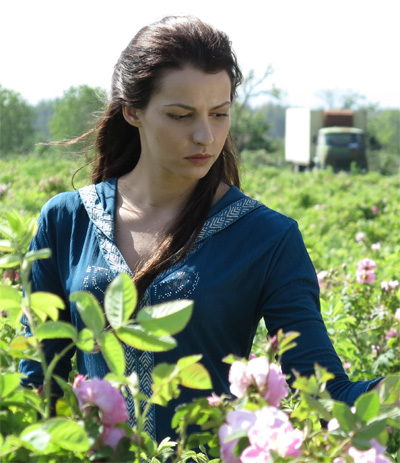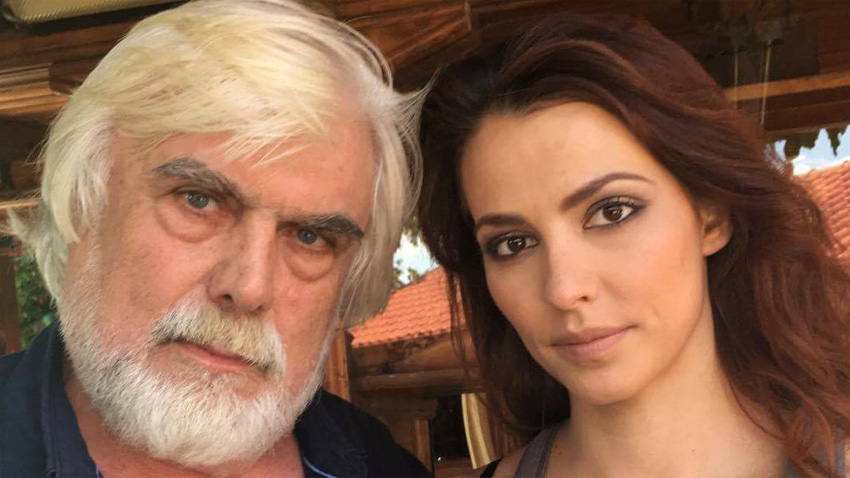The Bulgarian cinema has experienced in the recent years its long-awaited renaissance. Many new films and series emerged and attracted the attention of the local audience with their exciting plots. The scenarios of most movies, however, were influenced by the darkest hues of Bulgarian reality. Frauds, murders, thefts, rape and drugs are the invisible enemy the Bulgarian society faces on a daily basis. However, Damascena is a different movie. It is based on a true story and tells us about the dream of the Bulgarians to live a better, more comfortable and successful life. The name of the movie was not chosen by chance. Bulgaria is famous worldwide with two emblematic industries and crops which have been cultivated on these lands for centuries -tobacco and oil-yielding rose. The film tracks 50 years of the life of an ordinary Bulgarian boy who found his paradise in the Rose Valley. He was enchanted by the beauty of that place, established his own rose oil distillery and intended to spend the rest of his life there. The mishaps he went through, the choices he was compelled to make and his struggle to survive built the image of the ordinary modern Bulgarian. That is why many people are likely to recognize their own life drama when watching that movie. Perhaps many would ask themselves why this is a Bulgarian, rather than a European or American dream. This is so, because it was born and inspired by Bulgarian history, traditions and mentality, despite our attempts to ignore our roots.
 A young Bulgarian, who is starring as Queen Rose in this exciting story, makes her cinema debut. Neda Spasova tells Radio Bulgaria details on how she was chosen for that role and how she was captivated by the profession of an actress.
A young Bulgarian, who is starring as Queen Rose in this exciting story, makes her cinema debut. Neda Spasova tells Radio Bulgaria details on how she was chosen for that role and how she was captivated by the profession of an actress.
“I went to an audition in August 2015. I applied for performing the part of “Mowgli” (currently actress Simona Halacheva plays the part of “Mowgli”). However, I realized during the audition that this was a very difficult role. The film director noticed that, too. However, he gave me another chance later. I impressed the jury, although I was not chosen to play the part of “Mowgli”. Veselin Plachkov who was starring in that movie also attended the audition. Eight months later I received a phone call and was invited for the part of another woman in the movie.”
And here is what Neda told Radio Bulgaria about her choice to become an actress:
“I was twelve when I learnt in school about an audition for youth theatrical company. All my schoolmates showed interest in that audition. I was stubborn in the beginning, but eventually went to that audition. Earlier, I wanted to study psychology, become a psychotherapist and inspire people to change their lives for the better. However, I joined the National Academy for Theatre and Film Arts later.”

The movie Damascena was shot in the course of twelve months and over 50 actors star in it. Dimitar Banenkin and Luben Chatalov are also among the actors in the movie. Over 1,300 people took part in the crowd scenes, which makes this film production the largest in recent years. The music to the film is by Rumen Boyadzhiev junior. Poetess Maria Laleva is the script-writer. The film premiere will be held at the end of October, or the beginning of November 2017.
English version: Kostadin Atanasov
The exhibition "The Transylvanian Medieval Fortress" by the Romanian artist Ovidiu Carpusor will be presented from November 9 to 23 in the "Quiet Nest" gallery of the Palace Architectural Park Complex in the town of Balchik , on Bulgaria's Northern Black..
The national painting triennial with the theme "Bridges" will bring together 84 contemporary artists who will show 106 works in the Hristo Tsokev Art Gallery in Gabrovo. This year's theme of the exhibition - "Bridges" - includes two aspects,..
The OKO International Ethnographic Film Festival will be held in Sofia in the period November 8 to November 15th. The forum is realized with the support of the National Film Center, Sofia Municipality, the Embassy of Ukraine and the..
The fourth national Biennial of Illustrations opens today in the triangular tower of Serdica, part of the Regional Museum of History in Sofia. As..

+359 2 9336 661
